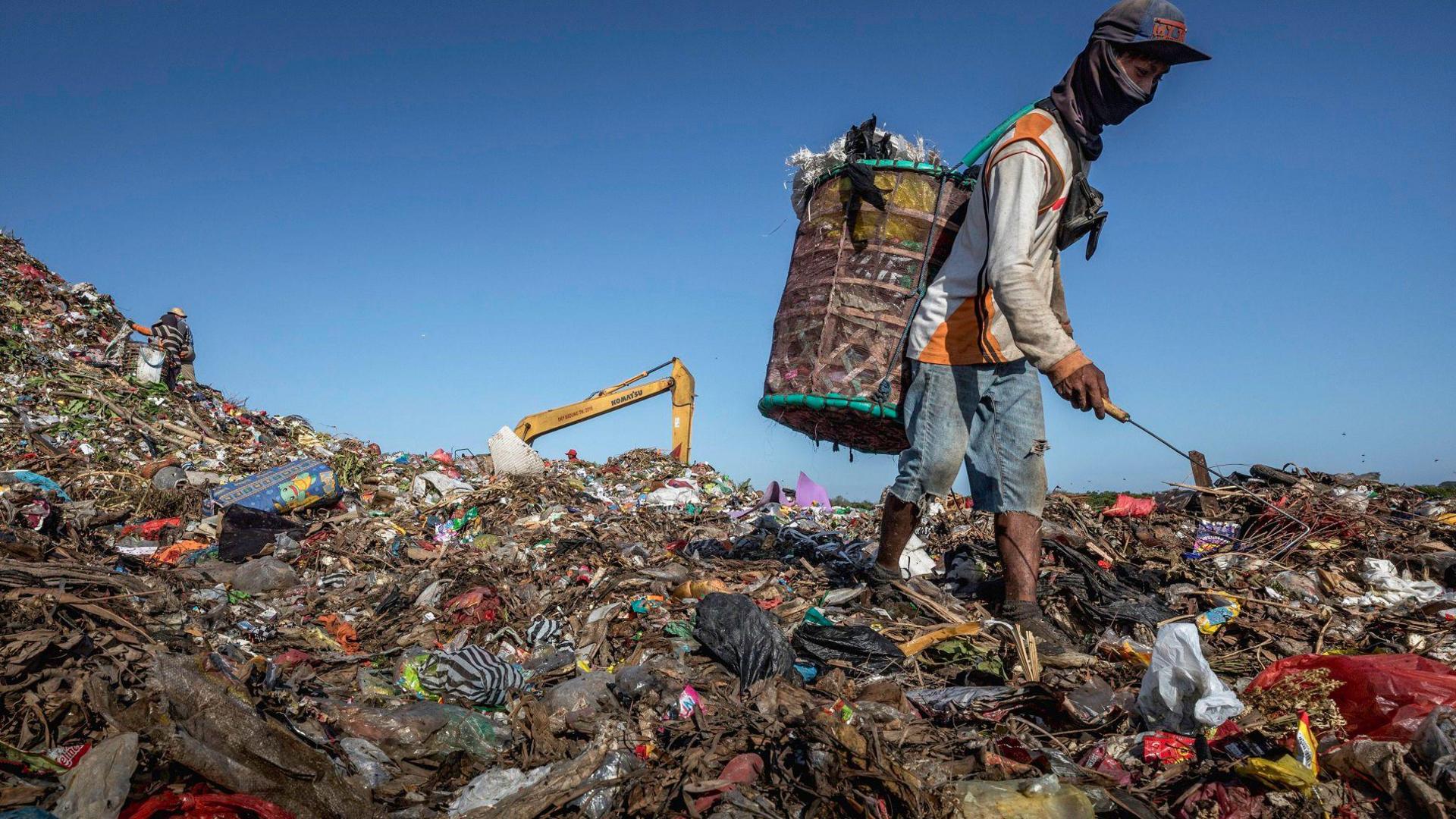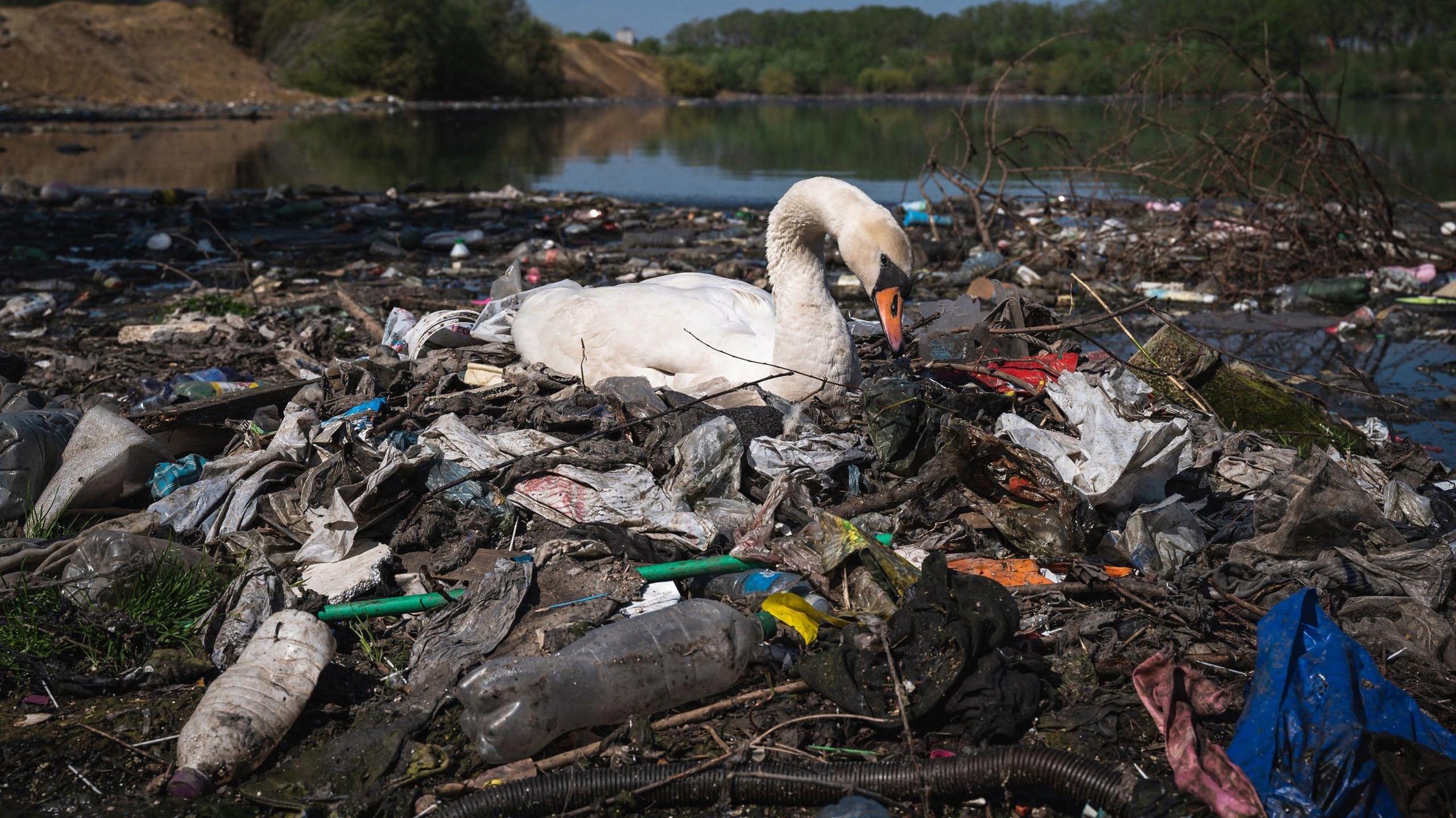Global plastic talks collapse as oil states rebel

More than nine billion tonnes of plastic has been produced globally with less than 10% recycled
- Published
Countries have failed to reach a landmark agreement on tackling plastic pollution after more than two years of negotiations.
More than 200 nations met in South Korea for what was meant to be a final round of talks.
But deep divisions remained between a group of nearly 100 "high ambition" countries calling for plastic to be phased out and oil-producing nations who warned this would affect the world's development.
"The objective of this treaty is to end plastic pollution not plastic itself, plastic has brought immense benefit to societies worldwide," said the Kuwait negotiators in the final hours.
In 2022, the world's nations agreed that a global treaty was needed to tackle the issue of plastic pollution particularly the impacts on the marine environment - and this should be completed within two years given the urgency of the issue.
Since 1950, more than eight billion tonnes of plastic have been produced globally but less than 10% has been recycled, estimates the United Nations, external.
This has led to millions of tonnes entering the world's oceans and seas, posing serious risks to wildlife and their environment, external. Birds, fish and whales can become injured or killed if they become entangled in plastic debris or mistakenly ingest it, leading to starvation.
Plastic is also produced from fossil fuels, and is currently estimated to be responsible for 5% of global emissions, external - so efforts to restrict it could also help with efforts to tackle climate change.
The meeting in Busan, South Korea, was meant to be the final fifth round of negotiations but after late night talks countries were unable to resolve their differences missing their key two-year deadline.
"A few critical issues prevent us from reaching a comprehensive agreement," said the talks' chair Luis Vayas Valdivieso on Sunday - the final day of talks.
Although many issues are being discussed the key split is around Article 6 - whether there should be a commitment to cutting how much plastic is produced, or just try and reduce plastic waste by increasing efforts to recycle.
Oceans littered with 171 trillion plastic pieces
- Published8 March 2023
Plastic waste 'building up' in Arctic
- Published8 February 2018
Hermit crabs are 'wearing' our plastic rubbish
- Published26 January 2024
A group of 95 countries have emerged, including the UK, European Union, African Group and many South American nations, who are calling for Article 6 to be a legally binding pledge to reduce production levels.
"We carry the weight of expectations of our citizens who are counting on us to protect them and the environment to protect it from the plastic pollution crisis," said Camila Zepeda, Mexico's chief negotiator, who spoke on behalf of this group at the final meeting.
"We must do everything in our power to meet this expectation."
Her speech was meet with strong applause across the room, but a group of oil-producing nations including Saudi Arabia, Iran, Kuwait and Russia pushed back strongly.
The demand for oil across most sectors is expected to fall from 2026 as countries move to cleaner technologies like electric vehicles - but plastic is seen as one of the remaining growth markets. This may explain why these countries are particularly concerned about any global target to cut production levels.
"Attempting to phase out plastic rather than addressing the issue of plastic production risks undermining global progress and exacerbating economic inequality," said Salman Alajmi, a Kuwait delegate.

The amount of plastic entering the world's rivers and seas is expected to triple by 2040 at current rates of production
India also voiced its concerns with including any commitments to cut production of plastic on the basis it could impact its right to development.
Environmental charities and scientists expressed their deep disappointment that the talks had collapsed and raised concerns about the influence of the fossil fuel industry.
InfluenceMap, a think tank, found that the petrochemical industry intervened dozens of times on the treaty via company statements, social media and consultation responses, and 93% of those were unsupportive of efforts to cut production levels.
But the report, external did highlight that these efforts were outweighed by positive support from key manufacturers and users of plastic products like Unilever, Mars and Nestlé who want consistent global regulation on the issue.
Jodie Roussell, global public affairs lead for packaging and sustainability at Nestlé, said of the talks' collapse: "Disappointingly, consensus among all nations remains elusive, which further delays critical action to end plastic pollution.
"It also fails to deliver the certainty that business needs to mobilise investment and scale solutions."
It is now expected that countries will reconvene next year to try and get an agreement, but Eirik Lindebjerg, global plastics policy manager at conservation charity the World Wide Fund for Nature (WWF), told the BBC that the group of 95 should go ahead with their own treaty.
"I think the political reality is that most countries in the world want this – that is the positive thing we can take from this.
"Those countries shouldn’t accept anything less than what they are asking for, there are already so many that a treaty would have a massive impact on ending plastic pollution and that option should be on the table."